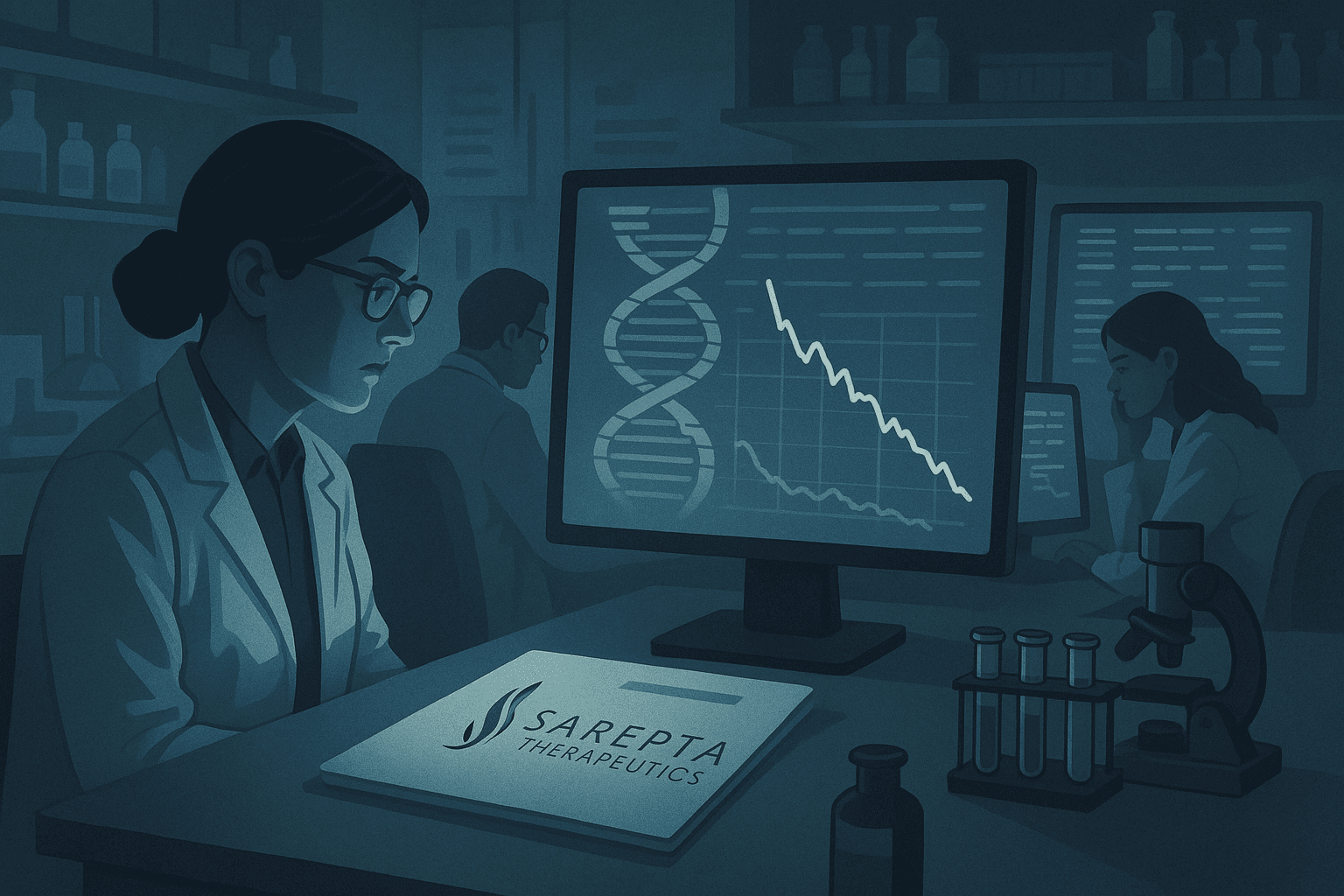Sarepta Therapeutics shares plunge after disappointing trial data

News Summary
Sarepta Therapeutics shares plunged 37% on Tuesday after the biotechnology company reported disappointing trial results for two of its Duchenne muscular dystrophy (DMD) treatments, Amondys 45 and Vyondys 53, which failed to achieve statistical significance in a confirmatory trial. This steep decline compounded an 80% drop in Sarepta's stock earlier in 2025. The study was designed to provide additional data for full regulatory approval of the two drugs, which currently hold accelerated approvals from the US Food and Drug Administration (FDA). This setback exacerbates Sarepta's ongoing challenges, as the company is already under FDA investigation following patient deaths linked to its top-selling gene therapy, Elevidys. Analysts warn that the failed trial could delay full FDA approvals and cloud Sarepta's growth outlook, though brokerages like Mizuho do not anticipate the FDA pulling the therapies from the market. Despite reporting a narrower-than-expected adjusted loss for the third quarter, the market reaction was overwhelmingly negative, underscoring the mounting challenges Sarepta faces in maintaining investor confidence amidst regulatory uncertainty and mixed clinical outcomes.
Background
Duchenne muscular dystrophy (DMD) is a rare genetic disorder primarily affecting boys, causing progressive skeletal and heart muscle weakness that worsens with age. Sarepta Therapeutics has long been a leader in developing treatments for DMD. The US Food and Drug Administration's (FDA) accelerated approval pathway allows for earlier approval of drugs for serious conditions based on surrogate endpoints, with confirmatory trial data expected to be available. However, full approval requires subsequent confirmatory trials to validate the drug's long-term safety and efficacy. Sarepta's Amondys 45 and Vyondys 53 previously held accelerated approvals, and the recently failed trial was intended to secure full approval. Prior to this, Sarepta's gene therapy, Elevidys, also faced intense FDA scrutiny following patient deaths.
In-Depth AI Insights
What are the broader implications of Sarepta's repeated clinical and safety challenges for the gene therapy sector? - Sarepta's struggles could lead to a more cautious and stringent review approach from the FDA for accelerated approval pathways and new gene therapy applications, particularly in rare diseases, even as the Trump administration generally favors deregulation, healthcare being an exception. - Investor confidence in the gene therapy space, especially in early-stage and high-risk assets, may erode, leading to a tighter funding environment and increased valuation pressures. - This situation could compel other gene therapy companies to strengthen internal safety protocols and clinical trial designs to mitigate similar regulatory and reputational risks, thereby increasing compliance costs across the industry. How might this setback impact Sarepta's long-term competitive positioning and M&A prospects, especially given its existing market presence in DMD? - Erosion of Leadership: Sarepta's long-held leadership in DMD treatments could be significantly eroded, opening market space for emerging competitors or more robust alternative therapies, increasing the risk of market share loss. - Decreased M&A Attractiveness: The company's persistent regulatory issues and clinical failures will substantially reduce its appeal as a potential acquisition target, with any M&A negotiations facing higher risk premiums and lower valuations. - Strategic Pressure: Sarepta will face immense pressure to rebuild investor confidence by diversifying its product pipeline or strengthening existing ones, otherwise it might be forced to pursue strategic collaborations or restructuring. Beyond clinical efficacy, what strategic lessons can be drawn regarding managing investor and regulatory expectations in the high-stakes gene therapy space? - Expectation Management: Companies need to be more explicit about potential risks and uncertainties in confirmatory trials when communicating the future prospects of accelerated approval drugs, avoiding undue optimism. - Transparency and Credibility: Timely and transparent reporting of adverse events and trial results is crucial for maintaining long-term credibility with regulators and investors, even if it causes short-term stock price volatility. - Risk Mitigation: For biotechnology companies heavily reliant on single or few key product lines, establishing stronger risk mitigation strategies, such as having a diversified R&D pipeline or clear crisis response plans, becomes especially critical.